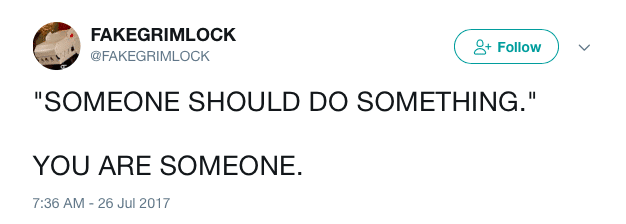You ever wonder if the pages of our comic books or the worlds of our superhero television shows and movies are populated by superpowered individuals who choose neither to engage in villainy nor to stand against it?
Like, they know they’re gifted, but for whatever reason…for any reason (fear, a preference for normalcy, a spandex allergy)…they choose to stay off the radar (and find Cerebro to be quite the invasion of privacy; there are lawsuits pending).
Yeah, me neither.
Wait, hold on…YES! Yes, I totally have!
I mean, let’s be honest right up front here: Should those individuals exist (and I believe they must), they wouldn’t make for very compelling narratives. I get that. But I want to talk about them anyway because their existence, their choices, may help shine a light on what makes your standard hero – and even villain – who they are.
“I can, but I won’t.”![]()
I’m currently reading the Thomas Covenant the Unbeliever series of books, and the first two are downright fascinating…and primarily so, at least to me, because the titular protagonist (if he can even be called that) has all this hero potential, but not an ounce of heroism.
He’s supposedly the reincarnation of a hero of legend.
His white gold wedding ring is the most powerful relic in the world.
And yet he’s convinced he is no hero and actively tries to sabotage his hero narrative.
I believe the third book will change all of this, but the fact that the first two stick to it so doggedly is interesting. In his case, its a mix of unbelief (he doesn’t believe the world he’s transported to is real and therefore that his actions – or inactions – have no consequence) and reluctance.
In other words: He doesn’t wanna.
Hero in potentia, but no hero.
Let’s revisit Cerebro. Imagine the Professor rolling up to a suburban home, hot on the trail of the newest mutant identified by his machine. He’s going over his usual spiel – “We can help you. Come learn how to control your powers at the school. Become a child soldier. It’s totally safe…Our grounds are only leveled by Juggernaut, raided by Purifiers, or transported across time and space about once every year or so.”
Only the young lady and her family are already aware of her abilities and turn Chuck down. “We just want to live a normal life. We’ll gladly take you up on your offer to help our daughter learn to control her powers…only we don’t want her weaponized, on a team, or in spandex. Control. That’s it.”
Surely the young lady has no less ability than Cyclops or Cypher–whatever her ability might be. But we’re learning that ability by itself does not a hero or heroine make (we’re starting in an obvious place).
“With great power…”
You know how the quote finishes. “With great power comes great obligation.”
Wait, wait, wait. That’s not right.
“With great power comes great responsibility.” Yeah, that’s it. Let’s talk about this phrase for a minute.
In its original printing (Amazing Fantasy #15, 1962), it reads,
…with great power there must also come – great responsibility!
That statement is an imperative thanks to the inclusion of the words “must also come.” When William Lamb uttered a similar phrase in 1817 (“the possession of great power implies great responsibility” – emphasis mine) or Winston Churchill did the same nearly a century later (“where there is great power there is great responsibility” – again, emphasis mine), an even stronger statement is made:
Great power = great responsibility.
So perhaps powered individuals aren’t obligated, but they are responsible. Does this then make their pursuit of a normal life, their avoidance of the exercise and utility of their power, whatever it might be, irresponsible?
Now for the punchline.
I want to close these posts by bringing our discussions of fictional characters into the real world briefly and thought-provokingly.
A friend of mine retweeted this the other day and I think it is the perfect capstone to this particular discussion.
Oftentimes we have the ability to intervene, to speak up, to make a difference…and yet we choose not to. Powered or not: Be mindful of the resources you do have and how you use them…or how and when and why you choose not to use them.
Normalcy may be attractive…But the world – both fictional and actual – needs heroes. And not all of them wear capes, cowls, have dual identities, or can manifest a power of any kind outside of courage and compassion.
If fictional heroes in potentia are irresponsible for not leveraging their resources, then why would we accuse ourselves of anything less?



